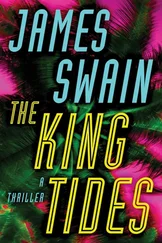“So what’s going on?” Keith said.
“Look,” Eriksson said. He paused. Cleared his throat. “I don’t know how to tell you this so I’ll just come out and say it. We got a call from ground. Your daughter has been in an auto accident.”
“What? What happened?”
“We don’t know yet.”
There was a moment of silence between them and then Keith said, “I don’t understand.”
Eriksson looked at him. “She’s gone,” he said.
“Gone?”
“Yes,” Eriksson said. Then: “I’m sorry, buddy.”
“Gone? What do you mean ‘gone’? Gone where?”
“Gone, Keith. She’s gone.”
“I don’t understand what you’re saying.”
Eriksson looked at him, not responding at first, only staring. Then he said, carefully and slowly: “Your daughter was killed in an accident.”
“What? Are you … you’re joking?”
“Not this time, buddy,” he said. “I wish I was.”
“This isn’t funny, Bill.”
No answer now.
“Quinn?”
“I’m sorry.”
“I don’t understand what you’re telling me,” Keith said. He was filled in that moment with a blinding and all-encompassing rage that flooded through him all at once and was just as quickly gone. “Jesus Christ. What … what are you saying, Bill? Jesus Christ.”
“I’m so sorry, buddy. Houston is waiting for your call. They probably know more.”
“Oh my god,” he said. His mind was blank. Then again: “Oh my god.”
“It’ll be …,” Eriksson began but he did not finish the sentence.
Keith looked at him. If there was some emotional response expected he could not find it now. There was an equation forming all around him but what the variables were, where the starting point was, he did not know.
Eriksson continued to stare back at him as if waiting for him to say something. “You want me to call in?” he said after a time.
“What?” Keith said.
Eriksson reached to the intercom and pulled it down from the wall and clicked the button. “Houston, Eriksson here.”
A moment later came the reply: “We read you. Go ahead, Bill.”
“I’m here with Keith,” he said.
“OK, stand by.” There was a pause and then the intercom crackled and the voice of Mission Command returned. “Keith, we have your wife standing by. Can you connect via laptop?”
“Where is she?” he said.
“He wants to know where his wife is,” Eriksson said into the intercom.
“Stand by,” the response came. Eriksson was looking at him. He could feel Eriksson looking at him. Then Mission Control again: “We don’t know the answer to that.”
“They don’t know where my wife is?”
“Look, they’ll connect her,” Eriksson said. “Where was she before? At her folks’ place? She’s probably there.”
There was a wave of confusion. He nodded but said nothing.
Eriksson pressed the intercom button again. “OK, we’re standing by,” he said.
“We read you. Standing by,” the voice said. There was a moment of silence and then the voice returned: “Keith, we don’t know what to say. We’re all … we’re all wishing you the best down here.”
“The best?” Keith said. He had not reached for the intercom nor depressed the button to be heard and so Eriksson said, “Understood.” And then, “Standing by.”
Eriksson left the intercom floating in the air before them. The two men adrift, neither speaking, not even looking at each other.
“This doesn’t …,” Keith said. And then, “This doesn’t make any sense.”
“I know,” Eriksson said. It was quiet between them and then Eriksson said, “Do you want me to get your laptop ready for Barb?”
“Barb,” he said. “No, I can do that.” As if to show that this action was indeed possible he opened the laptop and clicked on the appropriate icon to initiate the link.
“You’ll get through this,” Eriksson said.
“OK,” Keith said, simply. His voice was clear and he felt composed and ready, as if for some component of the mission that he had only just learned of but which nonetheless needed completing.
“Don’t worry,” Eriksson said.
“I’m not worried,” Keith said.
Eriksson looked at him carefully.
“What?” Keith said.
“Let’s talk after.”
“All right.”
“I’ll be just past the hatch if you need me,” Eriksson said.
“Got it.”
Eriksson looked at him again, his expression one of concern. “You all right?”
“Fine,” Keith said.
Eriksson nodded, turned, and pulled himself to the other end of the module. In a moment he was gone from sight.
The laptop before him was open and he stared at it for a long time before his eyes focused on its glowing background image, an image of himself and Barb and Quinn taken a few years before, a snapshot from a trip they had taken to Houston, one of the few actual vacations they had taken together. He was smiling awkwardly but both Barb and Quinn looked beautiful. How old had she been when the photograph was taken? Fifteen? Slightly younger?
He might have continued to stare at the image as he waited but his eyes blurred and when they refocused a point of light drifted in the air before him, a faint luminescence like a distant star. Like a diamond. His first thought was fascination. Then confusion. Then he recognized it at last as a drop of fluid, a liquid of some kind suspended in the recycled oxygen of the compartment. Then he could see another and then another, as if a collection of tiny stars were forming in the air a few scant inches from his face, a new and unknown constellation which he watched with curiosity as if the individual points of light had originated from some other source. Not from him. Not from the tears that floated out and away from him as if drawn toward the image on the screen. Look at those, he was thinking. I’ll have to tell her about this. Another, this large enough to wobble slightly until it settled into its silent shining orb. I’ll have to tell Quinn. Adrift then. Adrift.
The chamber filling slowly with tiny stars. Count them now and they will equal some infinity of zeros.
My daughter. Oh my god. My daughter is dead.
She must have been waiting for him because her high-pitched voice came almost the very moment he swung open the door: “Hey! Hey you, astronaut guy! Hey!” He might have simply swung it closed again but he did not and she continued to shout as she trotted in his direction from across the street.
He was embarrassed that he had opened the door yet again but he had come to hear the sound of a delivery truck in every low-frequency hum that wobbled through the empty rooms. Each time he waited for the doorbell’s ring or the sound of the driver’s knock and when no such sound came he would set down the paint roller and walk to the door in his socks and open it to find nothing — no package, no driver, no truck — instead only the emptiness of the cul-de-sac, the day coming to a close and darkness once again falling over the house like a shroud.
But this time he had opened the door not to silence but rather to the sound of the little girl who had run across the street from the direction of Jennifer’s house and now stood before him, bouncing slightly on the tips of her toes and smiling with excitement. “You’re the astronaut guy?” she said.
He sighed and glanced around the entryway for the box even though he already knew that there was no box to be found.
“Hello?” she called up to him. “Anyone home?”
“Yes,” he said at last, “I’m the astronaut guy.” He looked at her. She was perhaps nine or ten years old with brown hair pulled back in a tight ponytail. “Do you need something?” he said.
Читать дальше












